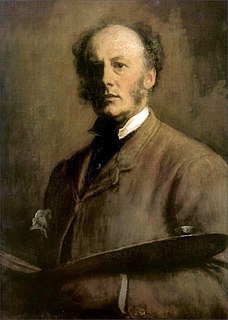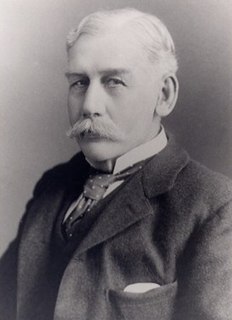Related Research Articles

Sir Charles Tupper, 1st Baronet, was a Canadian Father of Confederation who served as the sixth prime minister of Canada from May 1 to July 8, 1896. As the premier of Nova Scotia from 1864 to 1867, he led Nova Scotia into Confederation. He briefly served as the Canadian prime minister, from seven days after parliament had been dissolved, until he resigned on July 8, 1896 following his party's loss in the 1896 Canadian federal election. His 69-day tenure as prime minister is the shortest in Canadian history.

The Representation of the People Act 1832 was an Act of Parliament of the United Kingdom that introduced major changes to the electoral system of England and Wales. It abolished tiny districts, gave representation to cities, gave the vote to small landowners, tenant farmers, shopkeepers, householders who paid a yearly rental of £10 or more, and some lodgers. Only qualifying men were able to vote; the Act introduced the first explicit statutory bar to women voting by defining a voter as a male person.

The 1896 Summer Olympics, officially known as the Games of the I Olympiad and commonly known as Athens 1896, was the first international Olympic Games held in modern history. Organised by the International Olympic Committee (IOC), which had been created by French aristocrat Pierre de Coubertin, it was held in Athens, Greece, from 6 to 15 April 1896.

Horatio Herbert Kitchener, 1st Earl Kitchener, was an Anglo-Irish senior British Army officer and colonial administrator. Kitchener came to prominence for his imperial campaigns, his scorched earth policy against the Boers, his expansion of Lord Roberts' concentration camps during the Second Boer War and his central role in the early part of the First World War.

Sir John Everett Millais, 1st Baronet, was an English painter and illustrator who was one of the founders of the Pre-Raphaelite Brotherhood. He was a child prodigy who, aged eleven, became the youngest student to enter the Royal Academy Schools. The Pre-Raphaelite Brotherhood was founded at his family home in London, at 83 Gower Street. Millais became the most famous exponent of the style, his painting Christ in the House of His Parents (1849–50) generating considerable controversy, and he produced a picture that could serve as the embodiment of the historical and naturalist focus of the group, Ophelia, in 1851–52.

Hugh Culling Eardley Childers was a British Liberal statesman of the nineteenth century. He is perhaps best known for his reform efforts at the Admiralty and the War Office. Later in his career, as Chancellor of the Exchequer, his attempt to correct a budget shortfall led to the fall of the Liberal government led by William Gladstone.

George Rogers Clark was an American surveyor, soldier, and militia officer from Virginia who became the highest-ranking American patriot military officer on the northwestern frontier during the American Revolutionary War. He served as leader of the militia in Kentucky throughout much of the war. He is best known for his captures of Kaskaskia (1778) and Vincennes (1779) during the Illinois Campaign, which greatly weakened British influence in the Northwest Territory. The British ceded the entire Northwest Territory to the United States in the 1783 Treaty of Paris, and Clark has often been hailed as the "Conqueror of the Old Northwest".

Richard Lydekker was an English naturalist, geologist and writer of numerous books on natural history.

The Anglo-Zanzibar War was a military conflict fought between the United Kingdom and the Zanzibar Sultanate on 27 August 1896. The conflict lasted between 38 and 45 minutes, marking it as the shortest recorded war in history. The immediate cause of the war was the death of the pro-British Sultan Hamad bin Thuwaini on 25 August 1896 and the subsequent succession of Sultan Khalid bin Barghash. The British authorities preferred Hamoud bin Mohammed, who was more favourable to British interests, as sultan. In the agreement of 14 June 1890 instituting a British protectorate over Zanzibar, a candidate for accession to the sultanate should obtain the permission of the British consul, and Khalid had not fulfilled this requirement. The British considered this a casus belli and sent an ultimatum to Khalid demanding that he order his forces to stand down and leave the palace. In response, Khalid called up his palace guard and barricaded himself inside the palace.

One athlete from Victoria, a British colony which later formed part of Australia, competed at the 1896 Summer Olympics in Athens, Greece. Edwin Flack was born in England and was resident in London in 1896, but spent most of his life in Australia and so is considered an Australian athlete by the International Olympic Committee.

Ten athletes from the United Kingdom of Great Britain and Ireland competed in seven sports at the 1896 Summer Olympics. The Great Britain athletes were the fifth most successful in terms of overall medals (7) and tied for fifth in gold medals (2). The 7 medals came on 23 entries in 14 events.
Sir George Francis Hampson, 10th Baronet was an English entomologist.

Arthur Gardiner Butler F.L.S., F.Z.S. was an English entomologist, arachnologist and ornithologist. He worked at the British Museum on the taxonomy of birds, insects, and spiders.
The Church Mission Society (CMS), formerly known as the Church Missionary Society, is a British mission society working with the Christians around the world. Founded in 1799, CMS has attracted over nine thousand men and women to serve as mission partners during its 200-year history. The society has also given its name "CMS" to a number of daughter organisations around the world, including Australia and New Zealand, which have now become independent.

Athletes from the United Kingdom, all but three of its overseas territories, and the three Crown dependencies, can compete in the Olympic Games as part of Team GB. Athletes from Northern Ireland can also choose to compete as part of Team Ireland instead. It has sent athletes to every Summer and Winter Games, since the start of the Olympics' modern era in 1896, including the 1980 Summer Olympics, which were boycotted by a number of other Western nations. From 1896 to 2020 inclusive, Great Britain & NI has won 918 medals at the Summer Olympic Games, and another 32 at the Winter Olympic Games. It is the only national team to have won at least one gold medal at every Summer Games, lying third globally in the winning of total medals, surpassed only by the United States and the former Soviet Union.

San Thome Church, is known as St. Thomas Cathedral Basilica and National Shrine of Saint Thomas, is a Catholic minor basilica in the Santhome neighbourhood of the city of Madras (Chennai), in Tamil Nadu, India. The present structure dates to 1523 AD, when it was built by the Portuguese, over the tomb of Thomas the Apostle, one of the apostles of Jesus. In 1896, it was rebuilt in British Madras according to Neo-Gothic style, as was favoured by British architects in the late 19th century. This church is one of the three known churches in the world built over the tomb of an apostle of Jesus that are still standing today, the other two being St Peter's Basilica in Vatican City and Santiago de Compostela Cathedral in Galicia, Spain. In antiquity, there was a basilica built over the tomb of the Apostle Philip in Hierapolis of Phrygia, near modern day Pamukkale.

The Second Matabele War, also known as the Matabeleland Rebellion or part of what is now known in Zimbabwe as the First Chimurenga, was fought between 1896 and 1897 in the region later known as Southern Rhodesia, now modern-day Zimbabwe. It pitted the British South Africa Company against the Matabele people, which led to conflict with the Shona people in the rest of Southern Rhodesia.

Persimmon (1893–1908) was a British Thoroughbred race horse and sire. In a racing career that lasted from June 1895 to July 1897 he ran nine times and won seven races. His victories included the 1896 Epsom Derby, one of the first horse races ever filmed, by Robert W. Paul. His other important victories included the St Leger Stakes, the Ascot Gold Cup and the Eclipse Stakes. He was also notable for his rivalry with another English colt St Frusquin, who inflicted his only two defeats.

St. Frusquin (1893–1914) was a British Thoroughbred racehorse and sire. In a racing career that lasted from May 1895 to July 1896, he ran eleven times and won nine races. He was the best British two-year-old of 1895 when his five wins included the Middle Park Plate and the Dewhurst Plate. As a three-year-old, he added wins in the 2000 Guineas and two of the season's most valuable all-aged races: the Princess of Wales's Stakes and the Eclipse Stakes. He had a notable rivalry with Persimmon, another outstanding British colt whom he defeated in two of their three racecourse meetings.
SS Equity was a freight vessel built for the Co-operative Wholesale Society Limited in 1888.
References
- ↑ Free download from http://www.thedump.scoutscan.com/dumpinventorybp.php